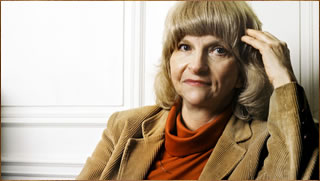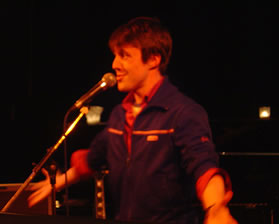|
De Indische schrijfster Kiran Desai werd geboren op 3 september 1971 in New Dehli. Zie ook mijn blog van 3 september 2008 en ook mijn blog van 3 september 2009 en ook mijn blog van 3 september 2010.xml:namespace prefix = o ns = "urn:schemas-microsoft-com:office:office" />
Uit: Hullabaloo In The Guava Orchard
It was this year that Sampath Chawla was born to his mother, Kulfi. She was twenty-one years old, newly married to Mr. Chawla, and pregnant. By late September the heat and lack of rain had combined to produce terrible conditions of drought. She grew bigger as it got worse. It got to be so bad that famine-relief camps were set up by the Red Cross to the west of Shahkot. The supply planes flew right over the bazaar and Shahkotians, watching with their heads tilted back, wondered why they didn't stop for them as well, for surely they were suffering quite enough to warrant the same attention and care being so assiduously delivered elsewhere. The ration shop was distributing rice and lentils in smaller and smaller portions all the time. There was no fruit to be found anywhere and hardly any vegetables. Prices had risen so high, nobody would buy the scraggy chickens sitting in cages outside the meat shop. Finally the poor butcher had to eat them himself, and after the last one, he was forced to turn vegetarian like the rest of the town.
Kulfi, in these months, was so enormously large, she seemed to be claiming all the earth's energy for herself, sapping it dry, leaving it withered, shriveled and yellow.
People stopped short in amazement as she walked down the street. How big she was! They forgot their dealings in the almost empty marketplace. They teetered on their bicycles as they looked around for just another sight of that stomach extending improbably before her like a huge growth upon a slender tree. Her eyes were so dark, so sooty and vehement, though, these people who turned their heads to stare turned quickly away again, ill at ease for some reason and unsettled. Not noticing them, she passed by as if they weren't there at all. On her face, about her mouth and in the set of her chin was an expression intent and determined but yet far away and distant, as if all her thoughts were concentrated upon a point invisible to everybody but herself. She walked through Shahkot like this, as distracted as this, as strange as this.
'What do you expect?' asked Ammaji, her mother-in-law, making excuses when curious neighbors asked about Kulfi's state of mind. 'What do you expect from a woman with a baby in her belly like a little fish?'

Kiran Desai (New Dehli, 3 september 1971)
De Uruguayaanse schrijver, essayist en journalist Eduardo Hughes Galeano werd geboren op 3 september 1940 in Montevideo. Zie ook mijn blog van 3 september 2008.en ook mijn blog van 3 september 2009 en ook mijn blog van 3 september 2010.
Uit: Upside Down
In Latin America children and adolescents make up nearly half the population. Half of that half lives in misery. Survivors: in Latin 5 America a hundred children die of hunger or curable disease every hour, but that doesn't stem their numbers in the streets and fields of a region that manufactures poor people and outlaws poverty. The poor are mostly children and children are mostly poor. Among the system's hostages, they have it the worst. Society squeezes them dry, watches them constantly, punishes them, sometimes kills them; almost never are they listened to, never are they understood.
Everywhere on earth, these kids, the children of people who work hard or who have neither work nor home, must from an early age spend their waking hours at whatever breadwinning activity they can find, breaking their backs in return for food and little else. Once they can walk, they learn the rewards of behaving themselves-boys and girls who are free labor in workshops, stores, and makeshift bars or cheap labor in export industries, stitching sports clothes for multinational corporations. They are manual labor on farms and in cities or domestic labor at home, serving whoever gives the orders. They are little slaves in the family economy or in the informal sector of the global economy, where they occupy the lowest rung of the world labor market:
* in the garbage dumps of Mexico City, Manila, or Lagos they hunt glass, cans, and paper and fight the vultures for scraps
* in the Java Sea they dive for pearls
* they hunt diamonds in the mines of Congo
* they work as moles in the mine shafts of Peru, where their size makes them indispensable, and when their lungs give out they end up in unmarked graves
* in Colombia and Tanzania they harvest coffee and get poisoned by pesticides
* in Guatemala they harvest cotton and get poisoned by pesticides
* in Honduras they harvest bananas and get poisoned by pesticides
* they collect sap from rubber trees in Malaysia, working days that last from dark to dark * they work the railroads in Burma.

Eduardo Galeano (Montevideo, 3 september 1940)
De Amerikaanse schrijfster en literatuurwetenschapster Alison Lurie werd geboren op 3 september 1926 in Chicago, Illinois. Zie ook mijn blog van 3 september 2007 en ook mijn blog van 3 september 2008 en ook mijn blog van 3 september 2009 en ook mijn blog van 3 september 2010.
Uit: Familiar Spirits
Jimmy and I might never have met again if we hadn't both found ourselves in Amherst, Massachusetts, five years later. I came in September 1954, as part of the baggage of my first husband, an Amherst College instructor in English. Jimmy, who had graduated from the college in 1947, arrived the following fall as a visiting writer, accompanied by his new friend David Jackson.
In 1955 Jimmy, though less nervous, was still thin and pale, with flat dark hair and something of the air of a clever, inquisitive bird. Later, when I learned that the name "Merrill" could be traced back to the French merle, or "blackbird," this seemed appropriate. He no longer casually paraded his superior learning and sophistication; he had become more sensitive to social situations and able to employ the perfect good manners he had learned as a child from his mother and governess. These good manners were one of his most striking qualities, and they carried over into his work. As he told an interviewer in 1967:
Manners for me are the touch of nature,... Someone who does not take them seriously is making a serious mistake....
The real triumph of manners in Proust is the extreme courtesy towards the reader, the voice explaining at once formally and intimately.
By 1955 Jimmy had also become something of a dandy. Though he wore conventional suits and shirts and neckties to official academic occasions, his everyday clothes were elegant but odd, sometimes slightly comic. He had a subtle, rather Art Nouveau color sense: he liked mauve and purple and apricot and turquoise silk or Egyptian-cotton shirts, and bright flowered ties. At home he often cooked breakfast in a Japanese kimono and sandals. I remember especially some red straw and silk sandals and a gray-striped silk kimono with deep sleeves cuffed in black.
At this time Jimmy had not yet achieved the attentive, contained, charming manner of his later years. He fidgeted with things, and was sometimes awkward and uneasy with strangers. He misplaced ordinary objects, and did not know how to drive. He frequently became panicky when faced with a mechanical or practical problem: a broken window blind, frozen pipes, missing student papers, a canceled plane flight.

Alison Lurie (Chigaco, 3 september 1926)
De Russische schrijver Sergej Dovlatov werd geboren op 3 september 1941 in Ufa, in het zuiden van Rusland. Zie ook mijn blog van 3 september 2007 en ook mijn blog van 3 september 2008 en ook mijn blog van 3 september 2009 en ook mijn blog van 3 september 2010.
Uit: Der Koffer (Vertaald door Dorothea Trottenberg)
Sagt also diese Schnepfe im OVIR zu mir:
Jedem, der ausreist, stehen drei Koffer zu. So ist die vorgeschriebene Norm. Es gibt eine spezielle Anordnung vom Ministerium.
Es hatte keinen Sinn zu widersprechen. Ich widersprach natürlich trotzdem:
Bloß drei Koffer?! Wo soll ich denn hin mit den Sachen?
Zum Beispiel?
Zum Beispiel mit meiner Rennwagensammlung.
Verkaufen, erwiderte die Beamtin ungerührt. Und fügte dann mit leicht gerunzelter Stirn hinzu:
Wenn Sie mit irgendetwas nicht zufrieden sind, machen Sie eine Eingabe.
Ich bin zufrieden, sage ich.
Nach dem Gefängnis war ich mit allem zufrieden.
Na, dann führen Sie sich gefälligst etwas anständiger auf ...
Eine Woche später packte ich bereits meine Sachen. Und es zeigte sich, dass ich mit einem einzigen Koffer auskam.
Vor lauter Selbstmitleid hätte ich beinahe angefangen zu weinen. Schließlich war ich sechsunddreißig Jahre alt. Achtzehn Jahre davon hatte ich gearbeitet. Etwas verdient, mir etwas gekauft. Mir eingebildet, über einen gewissen Besitz zu verfügen. Und am Ende ein Koffer. Obendrein von recht bescheidenen Ausmaßen. Ich war also bettelarm? Wie war es bloß dazu gekommen?!
Bücher? Aber ich besaß hauptsächlich verbotene Bücher. Die der Zoll nicht durchlassen würde. Ich musste sie also an Bekannte verteilen, zusammen mit meinem sogenannten Archiv.
Manuskripte? Die hatte ich schon längst heimlich in den Westen geschafft. Möbel? Den Schreibtisch brachte ich zum Gebrauchtwarenladen. Die Stühle holte der Künstler Tschegin ab, der sich bisher mit Kisten beholfen hatte. Den Rest warf ich weg. Und so reiste ich mit einem Koffer aus. Er war aus Sperrholz, mit Stoff überzogen und vernickelten Beschlägen an den Ecken. Das Schloss funktionierte nicht. Ich musste meinen Koffer mit einer Wäscheleine umwickeln.
Früher war ich mit dem Koffer ins Pionierlager gefahren. Auf dem Deckel stand sorgfältig mit Tinte gemalt: Jüngste Gruppe. Serjoscha Dowlatow. Daneben hatte jemand wohlmeinend Kloputzer hingekritzelt. Der Stoff war an einigen Stellen eingerissen.
Von innen war der Deckel mit Fotos vollgeklebt. Rocky Marciano, Armstrong, Joseph Brodsky und die Lollobrigida in durchsichtiger Kleidung. Der Zöllner versuchte, die Lollobrigida mit den Fingernägeln abzureißen. Letzten Endes zerkratzte er sie nur. Brodsky hingegen rührte er nicht an. Er fragte bloß: Wer ist das? Ich erwiderte, ein entfernter Verwandter ...

Sergej Dovlatov (3 september 1941 - 24 augustus 1990)
Onafhankelijk van geboortedata:
De Duitse dichter, schrijver en striptekenaar Lino Wirag werd geboren in 1983 in Pforzheim. Zie ook mijn blog van 3 september 2009 en ook mijn blog van 3 september 2010.
Uit: Schnitt // Vorlagen
I // SUPPLICATION // Thomas steht am Tisch u. hackt mit Kraft Karotten, Kartoffeln, Scheiben rollen von der Brett-, der Tischkante auf den Boden, wo sie driften u. auskreiseln. Marina weiß nichts: hält das Rührgerät wie eine Strahlenkanone, flüsternd: Heilige Mutter Maggi Fix, steh uns bei in dunkler Stunde, mater misericordiae. So hält sie die Hände fleischlich beieinander u. weiß nichts von dunklen Tunken, nichts von der Kraft der Karotten, Kartoffeln. //
II // DELIVERANCE // Verena in Stockings, Leggings hat sich in die Ecke gelaufen; schutz-, bewusstlos; dass die andere sie (punktament) anvisieren, abservieren kann. Hic Verena (in Stockings, Leggings), hic die andere, hie heroischer Lebensdurst (wiewohl schutz-, bewusstlos), da Abdeckerwillen, maliziöser. Hebt die eine den Lauf, da --- Ne Scheiße, dat Fernsehn heute, sagt der Vadder u. drückt die Glotze aus kraft seines Daumens. Die Kinder aber gehen zu Bett. //

Lino Wirag (Pforzheim, 1983)
|



